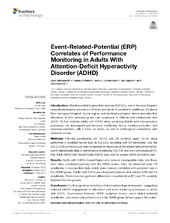| dc.contributor.author | Marquardt, Lynn Anne | en_US |
| dc.contributor.author | Eichele, Heike | en_US |
| dc.contributor.author | Lundervold, Astri | en_US |
| dc.contributor.author | Haavik, Jan | en_US |
| dc.contributor.author | Eichele, Tom | en_US |
| dc.date.accessioned | 2019-05-29T12:58:23Z | |
| dc.date.available | 2019-05-29T12:58:23Z | |
| dc.date.issued | 2018-04-11 | |
| dc.Published | Marquardt LA, Eichele H, Lundervold A, Haavik J, Eichele T. Event-related-potential (ERP) correlates of performance monitoring in adults with attention-deficit hyperactivity disorder (ADHD). Frontiers in Psychology. 2018;9:485 | eng |
| dc.identifier.issn | 1664-1078 | |
| dc.identifier.uri | https://hdl.handle.net/1956/19819 | |
| dc.description.abstract | Introduction: Attention-deficit hyperactivity disorder (ADHD) is one of the most frequent neurodevelopmental disorders in children and tends to persist into adulthood. Evidence from neuropsychological, neuroimaging, and electrophysiological studies indicates that alterations of error processing are core symptoms in children and adolescents with ADHD. To test whether adults with ADHD show persisting deficits and compensatory processes, we investigated performance monitoring during stimulus-evaluation and response-selection, with a focus on errors, as well as within-group correlations with symptom scores. Methods: Fifty-five participants (27 ADHD and 28 controls) aged 19–55 years performed a modified flanker task during EEG recording with 64 electrodes, and the ADHD and control groups were compared on measures of behavioral task performance, event-related potentials of performance monitoring (N2, P3), and error processing (ERN, Pe). Adult ADHD Self-Report Scale (ASRS) was used to assess ADHD symptom load. Results: Adults with ADHD showed higher error rates in incompatible trials, and these error rates correlated positively with the ASRS scores. Also, we observed lower P3 amplitudes in incompatible trials, which were inversely correlated with symptom load in the ADHD group. Adults with ADHD also displayed reduced error-related ERN and Pe amplitudes. There were no significant differences in reaction time (RT) and RT variability between the two groups. Conclusion: Our findings show deviations of electrophysiological measures, suggesting reduced effortful engagement of attentional and error-monitoring processes in adults with ADHD. Associations between ADHD symptom scores, event-related potential amplitudes, and poorer task performance in the ADHD group further support this notion. | en_US |
| dc.language.iso | eng | eng |
| dc.publisher | Frontiers | eng |
| dc.rights | Attribution CC BY | eng |
| dc.rights.uri | http://creativecommons.org/licenses/by/4.0 | eng |
| dc.subject | event-related potentials | eng |
| dc.subject | ADHD | eng |
| dc.subject | P3 | eng |
| dc.subject | ERN | eng |
| dc.subject | Pe | eng |
| dc.subject | performance monitoring | eng |
| dc.title | Event-related-potential (ERP) correlates of performance monitoring in adults with attention-deficit hyperactivity disorder (ADHD) | en_US |
| dc.type | Peer reviewed | |
| dc.type | Journal article | |
| dc.date.updated | 2019-01-24T08:54:56Z | |
| dc.description.version | publishedVersion | en_US |
| dc.rights.holder | Copyright 2018 The Author(s) | |
| dc.identifier.doi | https://doi.org/10.3389/fpsyg.2018.00485 | |
| dc.identifier.cristin | 1578717 | |
| dc.source.journal | Frontiers in Psychology | |
| dc.relation.project | Norges forskningsråd: 259293 | |

